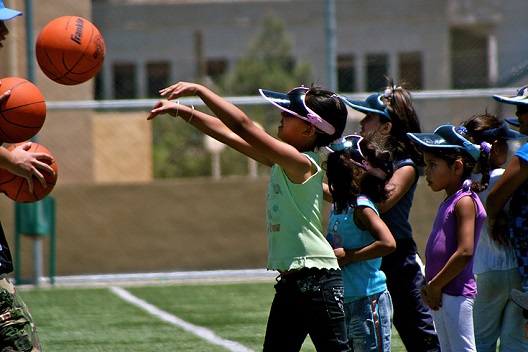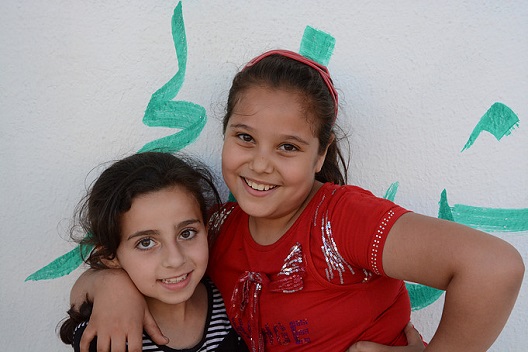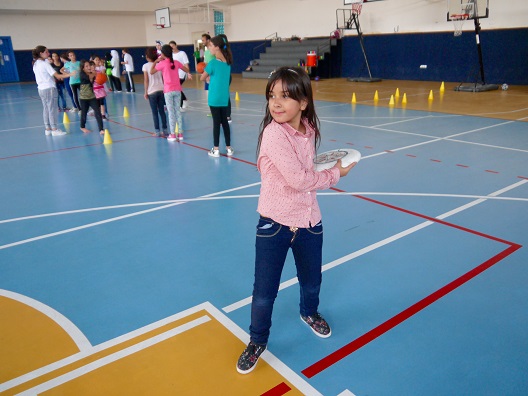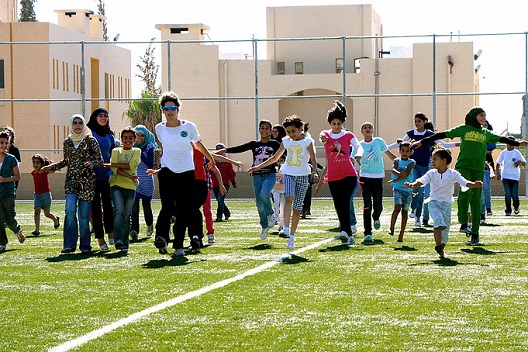 We know that conflict exacerbates existing gender inequalities within a society and disproportionately affects women and girls, many of whom experience abuses such as rape, domestic violence, early marriage, lack of educational opportunities, and harassment.
We know that conflict exacerbates existing gender inequalities within a society and disproportionately affects women and girls, many of whom experience abuses such as rape, domestic violence, early marriage, lack of educational opportunities, and harassment.
Less studied, though, is how displacement affects girls who are coming of age as refugees in the Middle East specifically, and more importantly, how to support them. Amy Spindler, Adolescent and Girl Advisor for the NGO Mercy Corps, said that Syrian girls often become invisible once displaced: “They are hidden at home and tasked with meeting their family’s basic needs. They are also at a much higher risk for physical and sexual assault when securing food, water, shelter, or clothing.”
In August, 2016, I collaborated with an Amman-based NGO called Reclaim Childhood which provides psychosocial sport programming for at-risk girls in Jordan. I spoke with 30 girls between the ages of 10-17 who had been displaced from their home countries of Iraq, Palestine, and Syria. Each girl faced a dual burden: being both female and a refugee. The study looked at what challenges girls from refugee communities face in Jordan, and how participation in psychosocial sports programs help them cope with these challenges.
Jordan hosts the sixth-largest refugee population in the world and has largely managed to maintain stability since the outbreak of the Syrian conflict in 2011. Many would argue that it has handled the influx of refugees relatively well compared to Lebanon and Turkey, even granting Syrians work permits in certain industries. However, when considering the gender component, the picture is much more bleak. As recently as 2012, UNESCO reported that women make up only 14% of the labor force in Jordan. The study finds that current gender dynamics combined with displacement in Jordan doubly confines women and girls to the private sphere.
In focus groups, the most frequently mentioned challenges included: lack of opportunities for recreation, social isolation, restricted movement, and lack of girl-friendly safe spaces. Many girls mentioned that they rarely ever leave the house, or that they only leave to go to school or Reclaim Childhood, and feel a deep sense of social deprivation: “We don’t do anything outside of the house other than this.” And: “Why don’t you keep us until school starts? Because we don’t get to go outside [the house] other than school.” Many refugee children also take on adult responsibilities such as working, either paid or unpaid. For girls, this often means staying home to care for younger siblings or perform domestic duties. One participant mentioned this specifically: “I am always staying at home alone. My mom works late and I have to watch my younger brothers so I don’t get to go out. So I like coming here to get out of the house.”
Less commonly mentioned challenges included serious issues such as lack of education, early marriage, traumatic experiences, and physical abuse. Nearly one-third of the girls I spoke with were not in school. One Syrian participant mentioned that she dropped out of school shortly after arriving in Jordan because she faced discrimination from both teachers and students because she was Syrian. Another fifteen-year-old participant mentioned that she dropped out of school to get married. She explained, “I’m getting married next week. He’s 24. I haven’t met him yet. If I like him, we’ll get married, if I say no, we won’t.” Additionally, one of the Iraqi Christian participants who recently arrived in Jordan had watched as ISIS militants burned her sister alive, and the psychological shock was apparent in her behavior. Two other Iraqi participants’ family members had been killed by Shia’ militia, forcing them to flee. Finally, although never discussed in focus groups, some of the girls’ bodies displayed evidence of physical abuse, including black eyes and scars. It was not always clear whether they had acquired these injuries from war, domestic abuse, or other causes.
Many girls from refugee communities in Jordan are also unable to play or have recreation time. Play is important for coping with stress and trauma, learning, and social integration, and its importance is further highlighted in Article 31 of the Convention on the Rights of the Child (CRC) which refers to the child’s right to leisure, play, recreation, culture, and the arts. Some participants attributed the fact that they were not able to play to causes ranging from not being allowed to go outside to living in a cramped residential space that does not allow play and games: “In the house, we don’t play, because our neighbors are below us and our parents don’t want to disturb the neighbors.” 
The girls explained that it is dangerous for them to go outside because boys and men dominate these spaces.
Participant 1: The streets are not safe.
Researcher: Why?
Participant 2: Because there are boys in the streets.
Participant 3: The guys are super gangster, they fight and kill each other in the streets, with knives, they fight.
Participant 1: The street is for the boys, right?
Participation in sports programs can help refugees cope with their situation, but this initial study found that sports are better positioned to support social and emotional development rather than address deeper issues of psychological trauma and school drop-out. The benefits of sport programming are wide-ranging, including providing opportunities to play and socialize in a girl-friendly and safe space, skill-building, and facilitating positive relationships, both friendships and mentorships. All 30 girls mentioned that they felt happy and had fun playing sports, and nearly all had made new friends through the program. Overall, data indicate that psychosocial sport programming has a positive influence on refugee girls’ well-being and resilience. Heba, a twelve-year old Sunni Muslim whose family was threatened by Shi’a militia in Iraq, said, “Playing sports helps me forget everything my family has been through.”
The families of the girls I spoke with support and encourage their participation in Reclaim Childhood, indicating that there is widespread demand for girl-friendly psychosocial sport programming, but lack of supply. As the average length of global refugee displacement approaches 20 years, it is critical that humanitarian and development interventions for refugee populations consider both the context-specific challenges that young women and girls face as well as creative solutions to alleviate such challenges. Female-specific resilience-building programs are desperately needed to help all refugee children in the region reclaim their childhood, integrate into their local community, and reach their full potential.
Dominique Spencer is a recent graduate of Columbia University’s Teachers College (MA ‘17) and a Grants Officer at the Institute of International Education in New York. This study was supported by a Summer Research Fellowship from the Department of International and Transcultural Studies and a Dean’s Grant for Graduate Student Research from Teachers College, Columbia University. The author wishes to acknowledge Reclaim Childhood program staff for assistance with data collection, particularly Yara Mehiar.
Image: Photo: Provided by author
